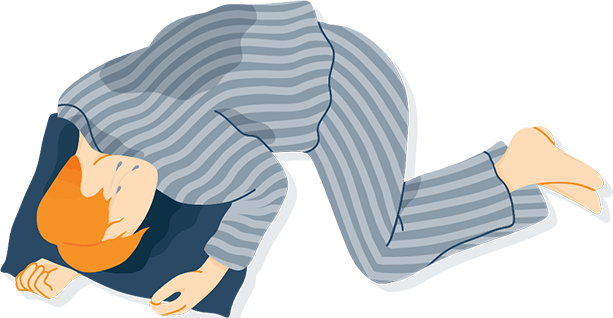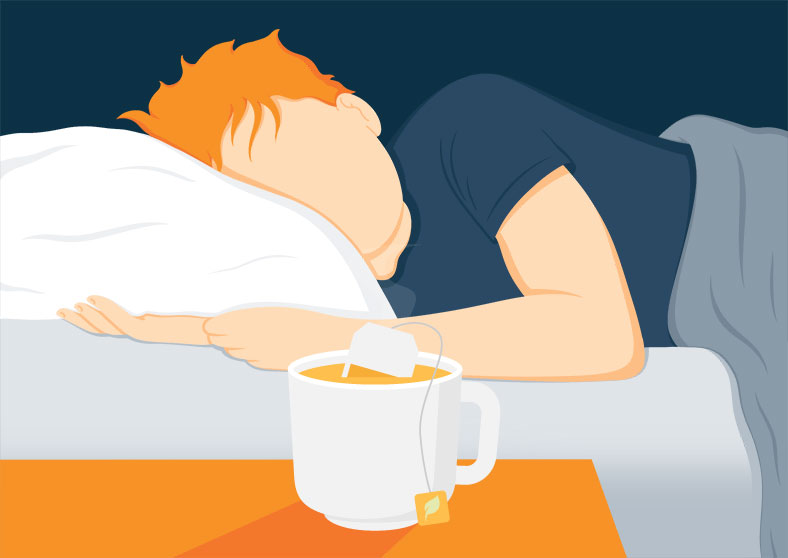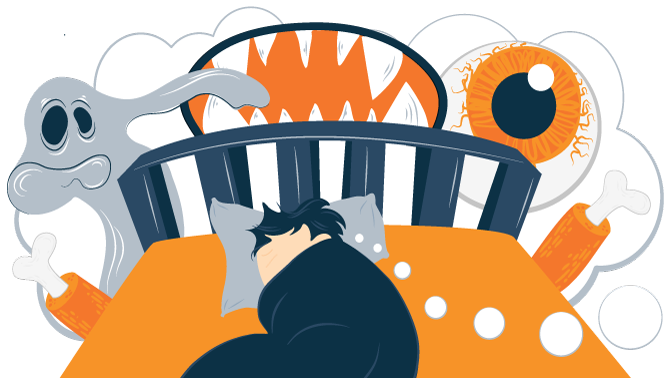While at rest, we cycle through different stages[1] that are classified as either REM or Non-REM (NREM) sleep, and we repeat the full cycle three to four times throughout the night.
Non-rapid eye movement sleep begins first and is broken up into three stages of its own: N1, N2, and N3.
- N1 is very short – usually lasting no more than 10 minutes. This stage occurs immediately after you doze off and is a light sleep in which you could easily wake up.
- During N2, your muscles will relax more, and you may start slow-wave brain activity. This stage can last for 30-60 minutes.
- The final stage of NREM, N3, goes on for 20-40 minutes and is a deeper rest in which you have increased delta brain wave activity and possibly body movements. Delta waves[2] are the slowest form of brain activity and are linked to restorative sleep.
REM – or rapid eye movement – follows NREM and is a deeper sleep. During this time, your eyes will typically flutter, and breathing may become irregular.
Find Out More: The 4 Stages of Sleep
A nightmare[3] is considered a dream that’s tied to negative, stressful emotions. While they are more common in children, adults can experience them too. According to University of Michigan Health, you do most of your dreaming during REM sleep, and that includes nightmares.
Night Terrors
Nighttime terrors are different from dreams. Harvard Medical School[4] reports that this type of disturbance is more prevalent in children than adults. Rather than scary dreams, this phenomenon is described as fearful reactions that usually happen while Stage N3 of NREM sleep transitions to REM.
Kids may kick or scream, but experts say they tend not to remember doing this since the terrors don’t happen during REM. They add that while nightmares are associated with a particular narrative, night terrors are not brought about by scary thoughts or images.
Read More: 13 Tips To Ease a Nightmare in Toddlers
Scary dreams aren’t always triggered by the same thing. Mayo Clinic experts say there are different reasons why we have nightmares.
Stress or Anxiety
Stressful parts of our everyday lives, such as work or relationships, could prompt a nightmare. Additionally, major life changes like losing a loved one or moving may cause anxiety and sweating that leads to unpleasant dreaming.
Scary Films, Books, or Television Shows
There’s a good reason why parents tell their kids not to watch a scary movie before bed; these types of media could lead to nightmares.
Sleep Loss
According to the Mayo Clinic, insomnia and sleep deprivation are linked to an increased risk of nightmares.
Certain Medications
Antidepressants, beta-blockers, and medications to treat high blood pressure and Parkinson’s disease are known to provoke bad dreams.
Alcohol and Drugs
Experts warn that the use or withdrawal of alcohol or recreational drugs may increase your chances of a bad dream.
Mental Health Disorders
Mental health disorders such as depression or schizophrenia are also considered a possible cause.
Traumatic Experiences
People living with post-traumatic stress disorder (PTSD) are also more vulnerable to nightmares.
The good news is there are proactive steps you can take to help prevent nightmares. According to the Mayo Clinic, these suggestions can be useful for both adults and children.
Establish a Calming Bedtime Routine
Having a relaxing bedtime ritual such as drinking herbal tea or meditating could help you avoid having nightmares by providing your mind a way to wind down, especially from negative thoughts.
Have a Support System
Whether it’s you or your child having disturbing dreams, it’s good to have someone around to say everything’s okay. For adults, a significant other, friend, or relative could be a good source of support.
Talk About It
Experts suggest talking about your bad dream and reminding yourself – or your child – that’s it’s not real.
Learn More: Why Do People Dream
Create a Happy Ending
Another option is changing the outcome. Instead of the scary ending that left you feeling frightened, write down an alternative, happy ending to your bad dream. This could be particularly helpful for kids who may feel more traumatized after a nightmare.
Manage Stress
When you notice your negative dreaming is linked to stressful thoughts and worries, find ways to manage those feelings. Practices that incorporate mindful, deep breathing such as yoga and mediation are popular for coping with stress. You may consider talking with a therapist as well.
Seek Out Things That Provide Comfort
Kids could benefit from objects that provide comfort such as a stuffed animal or special blanket. As an adult, you may not have a stuffed animal, but holding a pillow could offer solace. Individuals who sleep with a partner may also benefit from cuddling at night, as research shows that physical affection[5] helps release hormones that can improve your mood and help you feel more relaxed.
Night Light
Night lights are also a popular way to help kids feel reassured during the night.
Talk to a Doctor
In the event frequent nightmares are affecting your quality of sleep and overall health, you should consider discussing the issue with your doctor, who may be able to recommend some medical or mental health treatments.
What Do Nightmares Mean?
There’s plenty of interest in understanding the meaning behind dreams and nightmares.
Some health professionals suggest certain nightmare scenarios are a metaphor[6] for something going on in our lives. For example, a recurring nightmare could be indicative of a problem you still need to confront. Another example is that being chased by a monster in your dreams could imply you’re running away from something emotionally in your life.
What Are Common Themes in Bad Dreams?
According to psychology researcher Geneviève Robert[7], common nightmare themes are death, health concerns, and threats. She adds that men tend to have more disaster-related scenarios such as floods, earthquakes, and war. However, women’s narratives are typically centered around interpersonal conflicts.
Are Nightmares a Disorder?
While bad dreams from time to time are normal, frequent episodes may be cause for concern. According to the Mayo Clinic, nightmare disorder is considered a parasomnia. A parasomnia is a type of sleep disorder that involves unusual or disturbing experiences.
Nightmare disorder is diagnosed when the patient’s bad dreams cause significant sleep deprivation. In this case, you will want to contact your physician, who will likely discuss your symptoms, perform an exam, and suggest you undergo an overnight sleep study.
Sources and References:
- [1] “Stages of Sleep”, University of Michigan Health, October 26, 2020
- [2] Priyanka A. Abhang, Suresh C. Mehrotra, “Technological Basics of EEG Recording and Operation of Apparatus”, 2016
- [3] “Nightmare Disorder“, Mayo Clinic, June 5, 2021
- [4] “Nightmares and the Brain“, Harvard Medical School, 2015
- [5] “Cuddle and Hug Your Way to Better Health“, Intermountain Healthcare, February 12, 2020.
- [6] Richard J. Corelli MD, “Nightmares”, Stanford University
- [7] “Study Analyzes Content of Nightmares, Bad Dreams”, Science Daily
Jill Zwarensteyn
Editor
About Author
Jill Zwarensteyn is the Editor for Sleep Advisor and a Certified Sleep Science Coach. She is enthusiastic about providing helpful and engaging information on all things sleep and wellness.
Combination Sleeper





